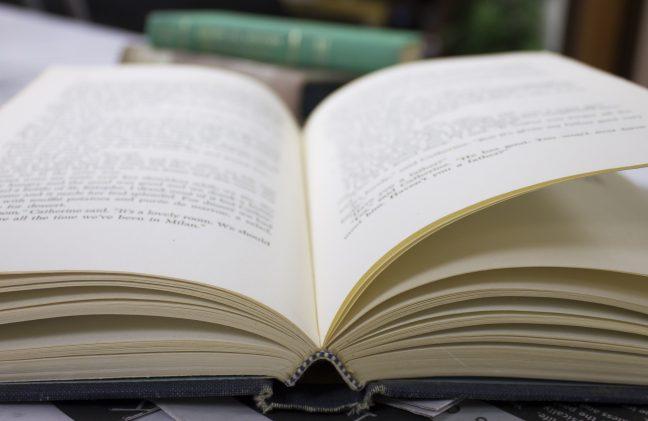University of Wisconsin history professor Jennifer Ratner-Rosenhagen teaches history through a familial lens in her class “The History of Your Parents Generation.”
The class is structured to allow students to interview their parents both at the beginning and end of the class. Assignments in between allow for students to learn about historical movements in the 70s, 80s and 90s through several different perspectives.
“I wanted to teach a class where students could really grasp that history is made up of people just like them,” Ratner-Rosenhagen said.
Though the class consists of everything from readings and quizzes, the main focus lies on the final paper, history teaching assistant Emily Tran said.
Students develop their own questions for their parents to create a unique angle for their paper. Through this, Tran said, students gain an opportunity to see their parents as artifacts of their time.
Senior Marko Uzierovic took the class as a second-semester freshman because he wanted to learn more about the cultural aspects of history. Uzierovic said Ratner-Rosenhagen was successful in bringing history closer to home.
“This class more than any other class put my parents in the role of history as people who made history, were influenced by history, who these political events in the textbook actually made impacts on and in ways that they may not realize,” Uzierovic said.
After examining history of intolerance, UW grapples with creating more inclusive future
As Uzierovic’s parents were war refugees coming from a balkanizing Yugoslavia, his final project focused on their experiences with Western culture as observed through the “cracks in the iron curtain.” He looked at how they saw culture differently than the parents of his peers, whose parents grew up in Wisconsin, or other areas of the U.S.
Uzierovic found it interesting that his mother had an obsession with Michael Jackson, and that his father owned albums from rock bands like Deep Purple. He saw many similarities between his parents and those across the globe, even though their political situation differed dramatically, Uzierovic said.
He also enjoyed many of the assignments from the class, including the readings meant to highlight different historical perspectives and a field trip to the state historical society.
“Professor Ratner-Rosenhagen did a really great job of showing the stories that aren’t usually in the forefront … [she] did a really great job of creating stories about individuals while also not buying into the trend of the 70s and 80s that individualism is the cure to societal issues,” Uzierovic said.
He mentioned several topics that came up in class, like White America’s reaction to multiculturalism and changing ideas around gender and sexuality. These were topics that might not come up in a more traditional history course, Uzierovic said, but ones he believed deserved to be discussed.
Tran, a class teaching assistant, does research on school desegregation during the 70s and said she was excited when she received the opportunity to work with Ratner-Rosenhagen.
“I think that the questions that Professor Ratner-Rosenhagen outlines are questions that we typically wouldn’t ask our parents without this excuse,” Tran said.“So I think it’s a really great way to get to know our parents as people, instead of just parents.”
Panel discusses how history of racism, white supremacy played role in Charlottesville
Tran discussed several ways Ratner-Rosenhagen engaged with students in the lectures, such as inserting pop culture “artifacts” like music videos and excerpts from books students might have heard about but never had the chance to read. She brought up several feminist books the students read previously when studying the women’s movement, including “Our Bodies, Our Selves” by the Boston Women’s Health Collective and “The Joy of Sex” by Alex Comfort.
Tran also shared the story of her parents, who lived in Vietnam during the Vietnam War and ended up fleeing to Canada. Many of the historical stories she heard came from a Western lens pertaining to the activism across North America in response to the war and contrasted the firsthand experiences of her parents in Vietnam.
Tran said teaching for this course has encouraged her to have a more open discussion with her parents about their experiences during this time period, something that Ratner-Rosenhagen mentioned as one of the most rewarding parts of teaching the class.
“Things like the Vietnam War and the culture wars, stagflation and the sexual revolution, deregulation and disco, as well as international relations abroad to race relations at home go from seeming remote and abstract to really concrete and powerful forces in history — their parents’ history,” Ratner-Rosenhagen said.
Wisconsin’s history of associating black skin with slavery still harmful today, UW professor says
Ratner-Rosenhagen also said it was rewarding to see many of her students chose to pursue history as an academic focus after taking her class. Uzierovic said it was after taking this class that he decided to become a history major.
Ratner-Rosenhagen said it’s also “gripping and moving” for her just to see the different connections students learn to draw between the life paths of their parents and historical movements in the final paper. She enjoys seeing the myriad of different angles her students take, each of which can end in a new and striking observation.
“I always had a pretty close relationship with my parents, especially being a first generation American … but [this class] gave me a lens of political events, cultural events,”
Uzierovic said. “All of these events are part of a larger societal picture, and we’re all engaging with these things every single day. History gives us a way of making sense of why all these things are happening to us.”













